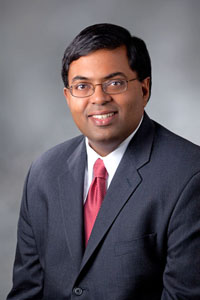Time Warner Cable's Indraijit Ponnambalam on Advice for Aspiring Cablers
By | July 10, 2013
Editor’s Note: In recognition and celebration of the diversity within the cable industry, we will be highlighting some of CableFAX’s 2012 Most Influential Minorities and their responses to a series of questions on mentorship, job skills and diversity. For the CableFAX Diversity issue in its entirety go here.

Indrajit Ponnambalam
CFO, East Region
Time Warner Cable
Ponnambalam has held numerous executive positions at Time Warner Cable and says he’s been fortunate to have many mentors over the years, both formally and informally. “We should take pride in making an impact wherever we can, while also motivating our teams to look continuously for opportunities to improve projects, initiatives and operations in our day-to-day work,” he says. Ponnambalam thinks the cable industry has made great strides in diversity over the years, but leaders in the industry can “do more to open up management roles for women and minorities.”
Tell us at least one true story of a mentor (or mentors) who gave you advice you still use to this day.
I have been fortunate to have many mentors over the years, both formally and informally. One was Steve Swad, who was AOL’s CFO when I worked in his organization earlier in my career. Steve had a list of guiding principles, one of which (and I’m paraphrasing here) was to always leave an issue in better shape than you found it in. We all face numerous business problems on a daily basis. While it’s great to come up with the perfect answer, we all know that batting 1.000 is unrealistic. We should take pride in making an impact wherever we can, while also motivating our teams to look continuously for opportunities to improve projects, initiatives and operations in our day-to-day work.
What advice do you have for young people trying to break into the cable industry?
Especially in this economy, take whatever opportunity you can that will expose you to smart people, interesting business models and an opportunity for career growth. Then be prepared to work hard and put in the time to learn about the cable industry, as well as your specific function. My first job out of school was not in the cable industry, but it required some crazy hours and tight deadlines. While I contemplated quitting after a few months, I am glad I ultimately completed the two-year program. I left that role having learned a great deal, and having a greater confidence that I could tackle whatever future professional hurdles I faced.
In your opinion, how is cable doing on diversity? Where do you want to see improvement?
I think the cable industry has made great strides in the area of diversity over the years. This is evident not only through industry organizations like WICT and NAMIC, but also through the efforts of individual companies. As the customers we serve continue to evolve, it’s critical for companies to have a rich and broad set of ideas at the table as they formulate their business strategies.
While I think we are making good strides in creating entry-level opportunities for people of all backgrounds, I think we as people leaders can do more to open up management roles for women and minorities. I know when I have key openings on my team, my first instinct is to think of people I have worked with in the past. If everyone applied this same logic, though, we’d have a very insular industry, with limited diversity of thought. I encourage all of us to meet and interview candidates of different backgrounds—when a position is open on our teams, or even just when an opportunity presents itself. By building these connections and relationships, we are more likely to reach out to these candidates down the road, even if they aren’t a great fit for any open positions today. Broadening the available talent pool can only help cable continue to innovate and lead in an increasingly competitive environment.